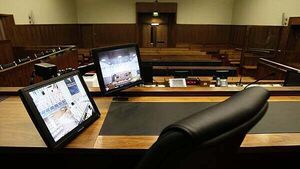Woman convicted of child cruelty has case discharged under probation act on appeal

Fionnuala Walsh
A woman who was convicted of child cruelty for smacking and hitting her young children has had her case discharged under the Probation Act on appeal.
One of her children said the behaviour “destroyed every way I could become a functioning adult” and “ruined every chance of making friends” in a victim impact statement to the District Court Appeals Court yesterday.
The woman, who cannot be named for legal reasons, had pleaded not guilty in the District Court to two counts of cruelty to children, contrary to section 246 (1)(2) of the Children Act, 2001. She was charged with assault in a manner likely to cause unnecessary suffering or injury to the children’s health or seriously affecting their wellbeing on dates unknown between August 1st, 2012 and December 19th, 2017.
She was convicted and sentenced to three months on both counts, fully suspended for a period of two years.
The woman later lodged an appeal against her conviction.
Garda interview
During a specialist garda interview in 2018, shown to the appeals court on a DVD, the woman’s younger child spoke about living with their mum, saying: “When I’m there I feel kind of safe but not safe”.
When the child was asked about the nature of “smacking”, the child answered that it was “like hit, very hard”. They said: “sometimes she catches us and hits us all on our bodies”.
When a garda specialist asked the young child where they would be sore, the child said: “On our backs, on our hands, on our mouth when we say bad words”. The child said: “it used to hurt so badly I couldn’t explain it”.
The child also described occasions where their mother would throw empty water bottles at them from the stairs, saying: “I felt scared”.
Speaking in court earlier this week over video link, seven years since the original interview, the child said that all parents shout, but “it gets to a point where it starts to become abuse”.
The child said that their father “has been the right parent for me for a long time” and that he was “never controlling”.
Footage from the second child’s 2018 interview was also shown to the court, where he said: “She sometimes hits us when she gets angry and she sends us into our rooms for a long time”.
Speaking about the smacking he said: “It leaves a red mark, it’s painful and she also does it a lot. She keeps doing it”.
He then described an incident where he was “pushed onto the wall” and the woman started hitting him “across the face” with both his own hand and her own. He said his head had felt woozy, “a combination between numb and shaky”.
The boy said that it was “painful on my wrist, my face and arm” and that “we were running around the house, she was chasing me, I was faster than her”.
He said: “she caught me on the back of the neck and then she started shouting at me”.
Evidence
In her evidence to the court, the appellant alleged that the father of her children had used “coercive control” during their relationship and that he had told her: “If you want a war you’re going to get a war.”
The woman said that her "heart was broken" for her children and that she was in touch with them secretly.
When asked about grabbing her son’s arm and hitting him in the face, she said did not recall any of the incident and that it may have been part of a game between her and the children.
She asked why she would do something like that without a reason and added that she was an “overprotective mum”.
In relation to pushing her son’s head against the wall, she said that it “never happened, never” and that it was “completely out of the question”.
In relation to the allegation that she kicked her son out of bed, she said that from what she could recall he was “impatient and jumped on us” but they had “all laughed”.
The woman said that she was surprised to hear of this allegation because she said the child got the most of her attention that night. She said that it “could have been a reflex” when he jumped on the bed unexpectedly, but “he put it in a different scenario”.
In relation to a statement she made in 2018, where she said she would tap the children on the mouth, she said: “It is tapping, there’s not violence, no force” and that she was touching them on the mouth, not hitting.
The woman said that when they were loud it was “from joy” and that she “doesn’t consider it abuse, shouting”.
When asked by State Solicitor, Niamh McKernan, how many times she changed solicitors, the woman said that she did not know and that it was not her intention to delay the matter for nearly seven years.
Judge Deirdre Browne explained that the prosecution were suggesting that her changing legal representation several times was an effort to delay matters, and this was a part of being cruel and neglectful, to which the appellant replied: “I disagree”.
The prosecutor also noted that one of the children said in their evidence that their father allows contact with the woman but that they "don't want to”.
The woman replied “it’s not true”.
The woman said that there was “nothing important in my life more than my children” and that she would do everything to recover her relationship with them.
Domestic abuse investigation
Ms McKernan highlighted that the prosecuting garda said there was no investigation into domestic abuse in relation to the father. She also said that both of the woman’s children confirmed that there was no pressure from their father to make claims about their mother.
The appellant said that her child “chose not to tell the truth today”.
Judge Browne said that this was a “very sad case” which is of “immense importance” to the family. She said she was satisfied that the charges in both cases had been made out by the prosecution.
She said that the first child gave evidence with a more general account of slapping over a period of time, whereas the second child’s evidence was more focused on one violent incident.
Judge Browne said that the evidence of the first child was clear, considered and “very, very definite”. She said that the child’s behaviour clearly showed them not wanting to talk about what was happening, rather than speaking about it under the influence of their father.
She said that a gesture made by the child in the garda interview of raising their hand “quite high” was compelling evidence of a child who had experienced a “hard smack”.
Judge Browne said that the smacking seemed to be a consistent theme and started from about the age of five or six.
In relation to the second account, she said that there was “probably some degree of exaggeration” but she had no doubt of a “violent tussle” between the woman and the child.
She said that his head was pushed on the wall, with his mother trying to subdue him by sitting on him. The judge said that she had “no doubt she hit him” in this instance, that she grabbed his hand and used it.
Defence counsel for the woman, Lydia Daly BL, said in mitigation that her client has no previous convictions and that there are no outstanding child protection concerns from Tusla in relation to the case.
Two character witnesses spoke positively of the appellant, with one saying that she is an “incredible person” and another saying that she is a “very warm, sincere and patient person”.
The first child told the court in a victim impact statement that the “manipulation and lies” had a big effect on them, adding that it: “just destroyed me.”
They said that they were very young at the time and couldn’t tell what was wrong or right, but “knew something was going on”.
They said that the process “destroyed my school and social life” and that “this back and forth ruined every chance of making friends”.
They said that they felt they could “never become a functioning adult like my peers” and that “school is hard, dealing with court”.
The woman's other child told the court that he has “not been able to trust people” and has lots of issues with relationships and friendships.
He said that he had many restless nights and days where he had not eaten. He said that he had missed school because of it.
He said he had not bonded with lots of people, "felt alone for a while" and had lots of issues.
Judge Browne said that if the woman had “faced up” to the reality presented to her many years ago, it would have been “so much to the benefit” of all. She said it was a “serious wrong” that things have gone on instead of being addressed.
The judge decided to discharge the woman under Section 1(1)(ii) of the Probation of Offenders Act, 1907, making the conditions that she must keep the peace for 24 months and enter the supervision of the probation service.
Judge Browne said that her application of the probation act was not an acquittal, but leaves the offending person without a criminal record. She said that it was “not an exoneration” but a chance to rebuild.
She also ordered that the woman must not mind children on a paid or voluntary basis and that she must complete a suitable and approved parenting course and aftercare. The woman must also complete a psychological course and therapy, with emphasis on offence-focused courses.
Judge Browne ordered that the woman have no contact, direct or indirect, with her children other than by court order, through legal representatives or by option of the children themselves.





